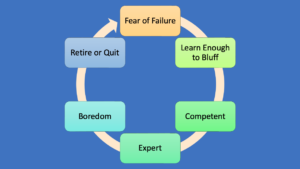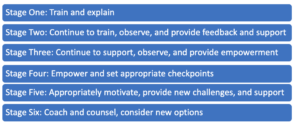
Although there are no guaranteed ways to gain employee loyalty, certain things can be done to build a robust employee-employer relationship. The two most important elements are trust and respect. Of course, you want, and expect respect, but so do your staff members, and when they receive it, you generally will gain theirs.
When employees believe that you are fair and that you care about them as people, they will be more concerned about the quality of their work, their achievement levels, and the business in general. You have a fine line to tread, and if you cross that line and remove your professional hat, you and your company may well be the losers.
Setting the Stage for Coaching Success
Great companies and organizations have learned to put key concepts into play – concepts that promote dynamic growth. Incorporating them into the overall operational process require human interaction to succeed. Without talented and motivated people, there are no concepts or strategies to implement.
Influential leaders coaching high performance individuals and teams have the knowledge, insight, understanding, and a clearly defined plan of what needs to be accomplished. They also can adapt to current circumstances and improvise the outcomes to be good for the customer, the business, and the employees.
Today’s front line coaches perform both the role of manager and leader and do both effectively and efficiently. Their goal is not to make themselves look good but rather to lead others to perform well and be recognized for their achievements.
The Life of an Employee and the Job Cycle
Managing is often a balancing act, and competition in today’s tightening marketplace creates a sense of urgency for leaders and managers. These individuals must plan, structure, and tailor assignments in ways that will result in productive and accurate outcomes, and they must also do that with what is often a reduced or new staff.
Coaching an employee to achieve excellence requires knowing where an individual is in your business’s life cycle. When you seek to motivate an employee, consider these factors based on where they are in the job cycle:

The coaching methods differ at each stage of the job cycle:

Coaching Tips at Different Stages of Empowerment
- Employee retention increases when you hire a talented person and conduct an in-depth onboarding process. The coaching goal is to get the employee to a competent level of performance as soon as they are ready. If they aren’t prepared, you must ask questions about your processes.
- If you give assignments before the person is ready to handle the task and fail to provide the training and support needed, you guarantee failure or mediocre performance. And just because someone says they can handle the job doesn’t mean they can, and it certainly doesn’t mean they can’t.
- On the other hand, if you fail to provide appropriate challenges and growth opportunities, you’re asking for trouble. Regardless of age, intelligent people want to be challenged, and without it, they get bored while many seek other jobs with companies they perceive fit their values better or have more upward mobility.
- The other alternative is the employee becomes stagnate and only contributes enough to get by. They become a drain on your payroll and keep a team from reaching peak performance.
- If the individual appears to retire on the job, ask for feedback and listen carefully. With the input from the employee, work together to move their performance back into a more productive and challenging mode. If the individual leaves the job, conduct a non-threatening exit interview to determine what could have been improved.
Delegate to Free the Leader and Unleash Talented People
Young and old leaders should have quality time to think and plan. When they are putting our fires all the time or don’t have quality time to think and plan, you’re missing out on good ideas that benefit the company.
Studies have shown that although most supervisors know they should delegate and even how and to whom, they may well continue to do some of the work themselves. After all, delegation brings with it the risk of losing absolute control. You don’t want the prisoners to run the prison, do you?
- The art of shared decision-making and shared responsibility leverages talent. This requires a mature and confident leader.
- When you use power and grant authority to people, it’s a necessary tool to retain talented people and get peak performance.
- Every great coach knows the parameters of their authority so they can delegate technical functions and routine decision-making. They have the ideas to predetermine specifically what needs to be done and what the outcome needs to be.
- Keeping a “delegators log” of who you delegated what to save valuable time. By “inspecting what you expect,” staff understands the importance of the tasks and the timeliness of achieving the goal in the predetermined timeframe.
- During the early stages of delegation, using mutually agreed upon checkpoints is vital while the individual or teams learn. Once you know a team can succeed, the coach’s role changes.
- Use your knowledge of the subordinate to ensure a good responsibility fit. Don’t give assignments to people who aren’t qualified or able to complete the task. In most cases, delegate only to your immediate subordinates.
- Delegate at your high energy periods if at all possible. If you are having a bad moment, hour, or day, resist the temptation to delegate at this time because normally, you are dumping tasks without much consideration of what your employee is going through. If you both are having a bad day, the delegation conversation might need to wait to be successful.
Tune-Up the Team Power
Team power is the result of a mix of people with genuine personalities and capabilities combined with effective coaching and leadership. Ordinary people can do extraordinary things when you unleash creativity.
- Consistent communication among team members, staff members, and departments creates the necessary stepping stones to achieving operational excellence.
- Positive feedback and recognition of ideas, good and bad, open up the culture to pilot testing ideas.
- Effective teams promote unity, cohesiveness, and natural “brain trusts” that function smoothly and efficiently to ensure that both the company and the staff profit from their work.
- Clearly defined goals and operational standards challenge a team.
- When you have a diverse group of personalities, clashes are part of the mix that create coachable moments. This blending of skills and experiences is manageable and often needed to empower teams.
A company is only as strong as its people. When the organization’s and staff’s goals are in harmony and everyone works together to ensure that those goals are met, everyone benefits.
![]()
